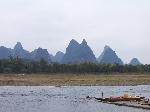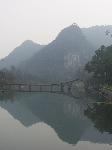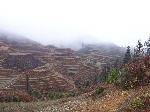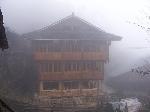- Getting around Lijiang. Dont stay in the Old Towns more than 2 days, there is nothing to do. KRISS Oct 9, 2013 05:46
- 2013 Beijing Temple Fair BENNYLAU Feb 26, 2013 03:29
- Malaysian traveling from KUL - LAX vis Shanghai PVG ZATI_DY Jan 3, 2013 20:15
<C>The Shark's Mouth and the Dragon's Backbone
- Views: 5506
- |Vote: 1 1
- |Add to Favorites
- |Recommend to Friends
The Shark’s Mouth
This is the gaping jaw of the world.
To travel the land between Guilin and Yangshuo along the Li River is to stare into the mouth of a shark. Row upon row of conical, tree-covered plinths of limestone rock called karsts are encrypted into each other, and they are tall and edgy and bony enough to be mountains except that they're so splintered they deny the linking parabolas of ridges. They are the iconoclasts in the world of mountains. The individualists. They are striking.
I was told by a young Korean boy in Yangshuo that there are only three places in the world where geology has gifted our eyes with such strange beauty: China, Australia, and Thailand. However, if you go online, karst formations are relatively common. Karsts are, by definition "formed by the complementary interaction of erosion and corrosion of carbonated aggressive waters"...whatever the heck that means. From what I gather, karsts are generally an underground thing, require a particularly argumentative relationship between water and rock in which the one wears down the other until the other gives in, and then stalagmite-type formations occur in amongst caverns and holes in the earth. How, then, these karsts (and the ones in Thailand and Australia) are chilling above ground is a story only the eons can reveal.
Trying to Outride the Weather
We had spent 6 days exploring this area, but not to the extent I'd have liked due to drizzly weather. Though Guangxi boasts relatively mild weather in the winter months, it’s prone to rain and the temperatures are colder than in neighboring Yunnan, one province to the West. The first day we rented tandem bikes from a friendly bicycle-tour shop (15RMB/day) and went cycling through the countryside toward Fuli town, on the other side of the Li River from Yangshuo, hopping off for a mini-exploration here and there, until nightfall turned us back. The next day we hired a guide from the same bicycle shop who took us riding out to Moon Hill. She was knowledgeable, enthusiastic, and inventive with her English. We had to front the fare to climb Moon Hill (15RMB) but our guide took us to some of the lesser-known caves and karst formations off the tourist track. The whole day with our guide cost 200RMB.
Another day we rented scooters to get further afield, an episode which started off promising and ended unfortunately due to the unpredictability of battery-operated vehicles. We began our journey along the main road back towards Guilin and later cut east, toward the Li River, along the smaller lanes and tracks. Our goal was to get to Yangdi and work back toward Yangshuo via Xingping, a route taken by the Li River boat cruises, which we had opted out of due to the unpredictable weather. However, our battery-operated scooters (at 50RMB a day) died before we could complete the journey, and we spent the rest of the afternoon getting them back to town...in the rain. I recommend going for the more expensive (100RMB a day) gas-powered motorbikes, which are more dependable and longer lasting.
From our hostel in central West Street (there are scores of affordable hostels along this main tourist artery) it was convenient and easy to find opportunities for exploring the wider regions of Yangshuo and the Li River. West Street offers everything from bicycle tours to walking tours to car or minibus tours to motorbikes and moped rentals. All are affordable, and in crummy weather they become more so. Even with just a map in hand and a basic feel for the land one can set out and enjoy amazing scenery and a fascinating environment.
When the weather was too poor and we didn’t want to brave the wet and cold, we spent hours in one of the cafes in town that is quite possibly the coolest cafe in China. Nestled on a tiny lane with quaint shops, between the Double Moons bridge and the Dragon Spring bridge, it’s away from the hustle and hum of touristy West street. Run by a cadre of young, hip-looking, outdoorsy and stylish Chinese folk, the cafe has two levels, a wood-stove for cooking pizzas, excellent music, large windows, funky colored decor and super-chill and comfy seating. We frequented this cafe for meals or tea-times so often that we departed on our last morning with hugs goodbye and promises of returning soon.
To the Dragon’s Backbone
After returning to Guilin from Yangshuo we took a bus north to the Dragon's Backbone Rice Terraces and Ping'An. The small local bus (30RMB) travelled out of Guilin at 4:30 in the afternoon through heavy, overcast clouds and drizzling rain. This view-obscuring weather persisted as the road got narrower and narrower and we passed village after village. People got on the bus by standing in the road and hailing it down and they got off by yelling at the bus driver, all in locations where no trace of human habitation was evident. There was nothing but curving pavement ahead, a steep pitch to the right and an abyss of fog to the left.
Every so often, like a sigh, the fog would suddenly clear and we could see, to the left or right, steep knobs of hillsides carved into ziggurats of rice fields (ziggurats are the pre-cursors to pyramids, tiered in steps like a wedding-cake). It was frustrating to have these glimpses and then to have the fog take them away again, like secrets it wasn't supposed to tell.
We arrived in the village of Heping at dusk and there were no more busses to Ping'An and no place to stay in Heping. Some odd haggling, a stop at the "entrance gate" and 70RMB later we were winding up what was supposedly gorgeous countryside in total darkness. The bus dropped us off at a large parking lot, and we were instructed to walk the rest of the way to Ping'An village. Cue Twilight Zone music: Parking lots? Entrance fees? A village full of hostels? A ticket-check booth on the route up to Ping'An? I thought I was going to a town but instead it felt like I was entering an Amusement Park. Are the supposed Zhuang villagers, residents of Ping’An and creators of the Rice Ziggurats, just cast-members in a farcical show?
Maintaining a Lifestyle
What nobody really tells you is the countryside in the area of Ping’An and LongSheng is in fact a Preserve of sorts. Though the land is still farmed and the people living there are genuinely carrying out their lives, tourism has taken on a new meaning. To enter the Preserve by vehicle one must pay the Park fee of 70RMB. It is possible to hike into Ping’An from the town of Heping, where our bus dropped us off, and forgo the entrance fee. But I didn’t know this and I hadn’t read it anywhere or heard it from anyone. I thought I was just cruising into another town in China.
Perhaps I was feeling a tad cynical. After all, that's essentially what travelling is: the opportunity to see different people and different places and different modes of living from your own. To experience them and try to appreciate them for what they are. But...still. Such commercialization? Commodification? Capitalization? It's embarrassing that we've come to an age where we can sell ourselves in that way. It's embarrassing that I have to pay. I didn't want to see the world in this way and I didn't want to see people in this way, putting on a show. I didn't want to be a tourist, a visitor. I want to be a traveller; I want to see life in all its dynamism, in its ups and downs; I want to happen upon moments of beauty and breathtaking scenery, not have them set up in front of me like a diorama at a museum exhibit.
But I also admire the entrepreneurship of the Ping’An villagers. It makes one wonder: would the Ping’An villagers’ lifestyle survive without this boost in income? Would they even still be here if I and every other tourist passing through didn’t pay a fee, or would they have migrated long ago to the city to find better-paying jobs? In an age when the whole world is modernizing, a lifestyle of ancient agriculture in the remote hills of China has no way to sustain itself unless it garners income through other means. I hoped the town and the villagers were direct recipients of the ticket sale profits.
Blind on the Backbone
Dawn broke the next morning to thick white fog. I stepped outside at 8 am and down to the cafe for some coffee and then a morning walk on my own. Heavy silence surrounded the morning except for the ululation of one cock crowing, an eerie sound that seemed to come form no particular direction, distended by the fog. A few people trudged by on the paths: some tourists; some villagers.
After breakfast we bundled up and set out on the paths to Zhonglin, the next village over the hills along the Dragon’s Backbone from Ping’An. There are a few villages within the preserve, all within day-long walks of each other. The fog remained unbeaten through the whole morning, and though we ascended the steep hillsides we could still see nothing beyond a few hundred meters. We passed little hamlets perched into alcoves on the hillsides, the clusters of homes narrow and towering on top of one another.
We trod on in the drizzling rain, barely discerning the steep terraces around us, browned and fallow for the winter. They are designed so water catches and pools within the terrace platform, tiered so that water loss is minimal. We walked for a few hours, through dense fern-laden pine forests and out again into the openness of the dragon-scaled hillsides, the fog lifting only in hiccups. The entire panorama was left to our imaginations.
On the way out of Ping’An we stopped to purchase postcards from a little shop-seller. For 5RMB we bought summertime images of the scenery we had missed. It was truly beautiful, and I hope it remains for a return visit, in the summertime.
The Chinese Have a Proverb...
...桂林山水甲天下 (guilin shan shui jia tian xia). Guilin's scenery is the first and best in the world.
But despite the popularity and fame of Yangshuo, Guilin, the Li River, Ping’An and all they have to offer, I don't like Guangxi Province nearly as much as other travel destinations in China. The weather, compared to Yunnan, Guangdong or Fujian, is much less agreeable to the late-January/early-February traveller. Though the area is touristy, the people are far less friendly on the whole but English is much more wide-spread. So many people can speak English that if you try to speak Chinese to them they give you a look as if you've just squatted down and defecated on their shoes. I've eaten more Western food, watched more television, read more English menus and signs and spoken more English to locals than I have anywhere in China so far. Which is nice if you have no experience with the Chinese language, and definitely fits with the "we're-on-vacation-let's-relax-and-spoil-ourselves" mentality, but it just wasn't what I was expecting.








 Copyright © 1998-2026 All rights reserved.
Copyright © 1998-2026 All rights reserved.
1.
Oct 12, 2006 12:26 Reply
CHYNAGYRL said:
Nice write up. I'm thinking of studying in Yunnan and going overland to Tibet next summer.